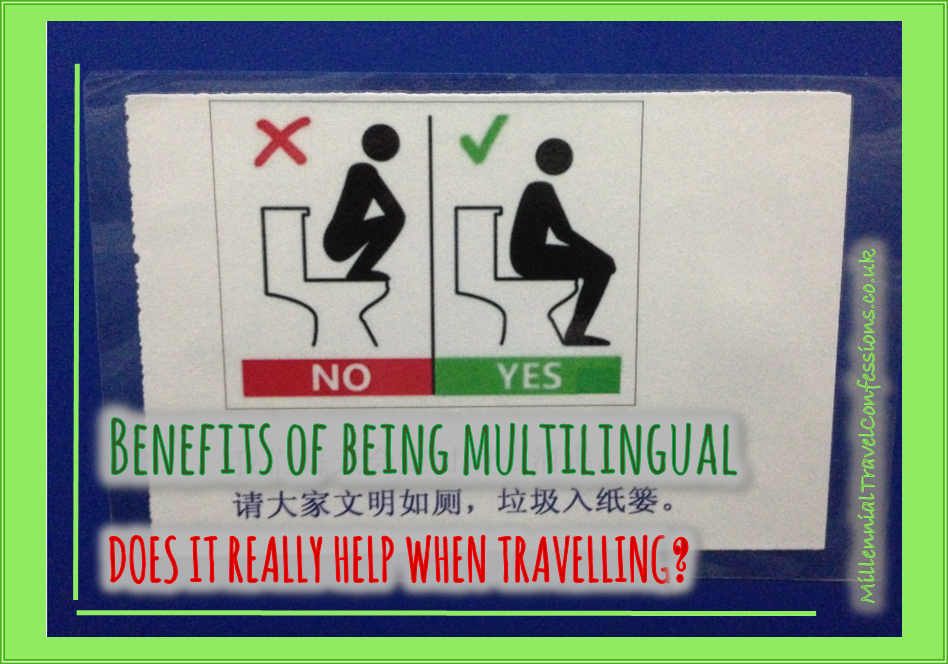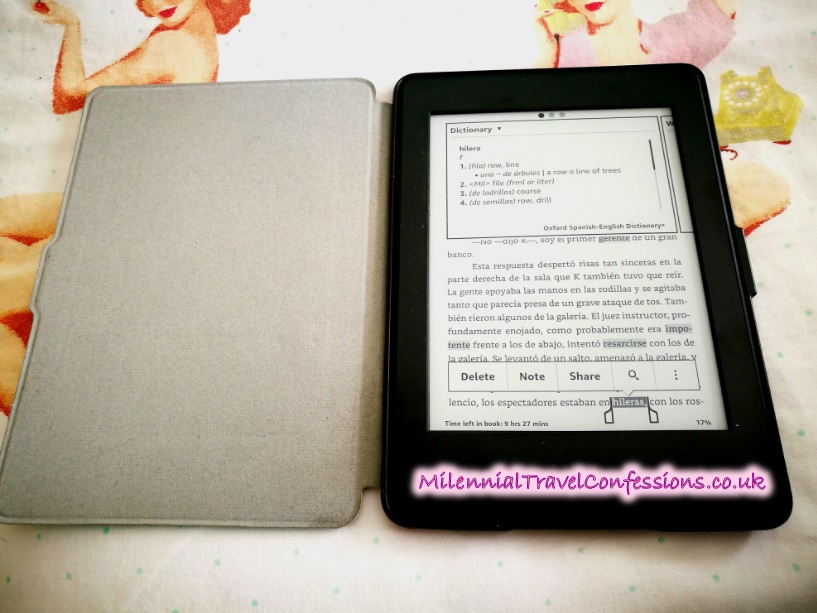Benefits of being Multilingual – Does it really help when travelling?

Today’s post is inspired by our stay in Portugal. If you decide to move to a foreign country without speaking the local language, things may be a little tricky, especially at first. But what challenges you is what shapes you as an individual. If you choose to travel, speaking more than just one language will come in handy sooner or later. So what are the benefits of being bilingual or being multilingual if you are traveling?
Digital Nomads and backpackers choose to travel in a different fashion than the average holiday makers. Whilst the latter one is all about things being catered for you, the two former travel types require some more effort in organising your stay and more interaction with the local people, culture, institutions and overall knowledge about the country of your destination.
Thanks to advancements in technology, it’s not only pensioners, business people and highly sought after specialists get to move abroad for an extended period of time. Whilst backpackers have always been there, the opportunities of working remotely are a lot more alluring these days. Thanks to technology, you don’t need large savings to move around the globe and see different parts of the world whenever is convenient for you.
Technology and benefits of being multilingual
In most cases you can get around speaking English when traveling, However, if this proves to be difficult, it’s best if you have a handy translation App that works also offline. This way you can minimise the risks of things getting lost in translation. Nowadays, many heavily dependent tourist destinations boast themselves about their staff speaking excellent English to up their rankings in the customer services.
However, choosing less known and more off the beaten track spots will simply make your traveling more challenging. Explaining where you want to go and what you want to see is not always easy if the locals speak virtually no English or their English is so limited that you won’t be sure whether you can validate information provided by them and go ahead with their suggestions.

When your phone battery dies or roaming does not work in a foreign country, paper maps are your new best friends. Speaking the local language will help you in finding your bearings.
Sometimes the local knowledge is indispensable and can save your butt if you know how and what to ask. Whilst it’s physically impossible to learn every single language in the world, there are some that will make your life a lot easier when travelling.
Learning a new language and benefits of being bilingual
Everyone will have a different opinion on what languages are easy to learn. There are many factors to take into account, like the native language you speak, your age or motivation to learn a particular language.
Depending on how long you’re planning to stay in a country of your choice, you may want or may not want to learn the language of a country that you’re staying in. If better understanding of the culture is on your priority list, then picking up a language will be very useful as it comes with many advantages!
So what exactly will you gain?
- Easier to communicate with a larger group of people
- Easier to make friends with people from outside of your own country
- You can read press and articles in another language without using Google Translate
- Wider selection of movies, YT videos and tutorials to pick from
- New personality – it almost feels like you are a different person when you switch to another language
- You are constantly learning new words, customs, history and different points of view for a better picture and analysis of situation
- More sources to choose from when reading or watching things – not everything is translated or subtitled
- You will challenge yourself as you often have to go out of your comfort zone
- Continuous training for your brain that will thank you one day for all the hard time
- Understand different humour that is specific to the country or region
- You become a group leader whether you want or not, only because you speak the language
- Going to offices, institutions or medical assistance is easier as you can explain yourself better
- People treat you well when you can communicate with them in their own language
- Once you’ve learnt a second language, it’s easier to learn another language of your choice
- You can communicate with people from the same language group (if you speak Spanish you will also understand some Italian or Portuguese). You can do it to some extent without having to find a translating tool. If you even decide to pick up another language from the same language group, you will master it a lot easier and quicker because of the similarities between them like same root words and grammar.
► Language and travel – how being multilingual can enhance your travel experience
Studying a language does not have to be boring. If you don’t see any purpose of learning a language at the moment, think of traveling. Whilst English is a safe bet, you will have a much better travel experience than other travellers if you can communicate in more than one language. You will be able to discover places known only to locals and have a casual chat with them.
What can combining languages with travel offer to you?
- Speaking the local language creates more authentic experience
- Better understanding of your speaker’s intentions that otherwise can be lost in translation
- Closer interactions with local people and culture
- You can use services and sites that are only available in a particular language – and speak with locals who know the deals and secrets rather than having to fall into a tourist trap

A warning board off the tourist beach in Portimao, Portugal. Countries where tourism is popular ensure that this kind of information is written also in English. English translation on such boards is less prominent if they are located away from tourist resorts.
Speaking more than one language is simply amazing. It makes your travel experience a lot easier and adds excitement to it. People are immediately more friendly towards you and want to share more with you. If you speak only English, you are limited to speaking to people who also speak good English.
On the other hand, if you speak the local language, you are included in the group discussions, learn the local humour and can embrace the culture a lot better. Studying in Barcelona for a year allowed me to make friends with natives and learn about their everyday lives, discover some good music, movies, attend musicals or participate in some events that non-language speakers wouldn’t understand.

People in Barcelona took it to the streets to show their support for independence of Calalonia from the rest of Spain. Although it’s written in Catalan, it is easy to read it for Spanish and other Romance language speakers.
Not to mention how speaking some Japanese helped us during our 3-month stay in Japan. Trust me, without knowing the language we wouldn’t have done what we did, such as getting a mud bath with the locals, being in the car with the Japanese locals who insisted on taking us around just because we spoke some Japanese.
Or even better, partying with locals in Osaka where we mixed broken Japanese and English. They were so friendly and showed us best grilled food places and clubbing spots. You can read more about our trip to Japan here and if you’re a visual person, watch it here but I think you get the gist – good things happen to those who actually make effort to understand the language and culture of another nation and who knows, maybe you can even start your own business using a foreign language?
How much better would it be if the natives showed you the local culture from their own perspective without having difficulties or using broken English when they use difficult terminology? I simply can’t explain how many more options do you have online when you are looking for a good quality accommodation or specific service that is advertised only on the websites for the residents of the country.
You can use plugins to translate pages online but emailing a person about a specific thing can be a bit more difficult. If you want a reliable translation, I would not pick easy Google translate option that still has many flaws so emailing in English is probably the better way. If you are comfortable speaking different languages, you can strike up a deal during face to face negotiations only because people will see you more friendly and open-minded.
Lastly, learning a new language makes you more aware of the surrounding world, certain habits and different ways of how businesses are ran in other parts of the world. Lastly, there are words that do not have a simple replacement in another language so why not embrace those wonderful diversities during your travels?

This is one of the best forms of learning and e-readers like Kindle Paperwhite or Kobo are ideal for learning languages and you get to choose what to read. You will learn grammar just by reading without even realising it!
How do you think I manage to keep my Spanish fluency? Although I don’t use Spanish on a daily basis at home or at work, I maintain it either through mobile apps or reading Spanish articles and books on Kindle – there’s an option to get a direct translation for the word you don’t know in multiple languages (including French or German). It’s much easier than having to look it up in your mobile dictionary and you can add it to your flash cards – for me it’s a total blessing. Funny enough, Kevin actually got me Kindle Paperwhite as a gift so we could reduce weight in our travel suitcase!
Not to mention that being multilingual helps us grow our presence online as I get to use Spanish, English, Polish and some Japanese for our Facebook page and reposting in other groups and on our Youtube Channel! I think you understand the importance of the languages and reaching a wider audience, whether it’s because of your passion, business or a combination or both.
► Benefits of being bilingual and multilingual in business
If you wonder why should you have to engage yourself in arduous studying, think few years ahead. Being bilingual or trilingual will make you a lot more marketable in your field and pay off in the long run. How can you benefit?
- You are more competitive than other candidates applying for the same job
- Bilingual jobs are lucrative, especially if you combine languages with niche skills
- Working in another country can become a reality with a single click
- Opening up your own business in another part of the world will be easier and significantly cheaper as you can find local labour without hefty agency fees
English is an international language and comes with endless benefits. However, knowing other languages will make you more competitive in the job market. If you like to travel, you can move and work in another country or travel for a few months and stay connected with your audience whilst benefiting from the ‘local’ ways of travel which are usually a lot cheaper – you are just more informed. Same goes for setting up businesses. You may find it easier to find a business partner in another part of the world.
Since there won’t be a language barrier, there will also be more trust. If you have great tech skills and work remotely, you will be able to travel without speaking any foreign languages. But think about how your experience could be different if you could gain local knowledge and make friends that can show you the local customs you may fall in love with?
► Health benefits and skills that come with being bilingual and multilingual
You might not have known about health benefits that come on top of career and travel options for those speaking more than one language. What are the benefits of having a bilingual brain?
- Helps improve performance in other subjects of study
- Better memory for names and directions
- Better planning and problem-solving skills
- Improved listening and communication skills
- Alzheimer disease symptoms are slowed down by another 4-5 years compared to those who speak only one language
- Cognitive flexibility advantage over monolingual brains like better attention or task-switching
Useful languages to learn if you’re considering traveling
When to learn Spanish language
Are you planning to visit Latin America? This language will follow you from the moment you reach the continent with an exception of Brazil and all the way up through Central America and even some states in the US. This is not where Spanish ends. Spain has a large population and millions of visitors each year. I’m sure most of us have been at least once.
Whilst Spanish is not spoken in Brazil and Portugal, you can get away speaking it, just like we do it here in Portugal. It may be rude to speak Spanish to a Portuguese person but in some cases explaining things in Spanish seems to work better than explaining things to locals in English. It is easy to pick up Spanish and once you feel comfortable with it, you will also be understood by Italians, Catalans and Romanians.
My French friend was very determined and she picked up Spanish quite quickly. Although there are some similarities, it may be more difficult to understand French by a Spanish speaker as opposed to other Romance languages.
When to learn Chinese language – stick to Chinese Mandarin
Despite Chinese Mandarin being spoken mainly in China, this country’s population is so large and middle class Chinese are now traveling to every possible tourist spot, leaving large chunks of money. This, in return, has created a large demand for speaking Chinese in the more touristic destinations.

Chinatown in London on a Friday evening. Visited by the Londoners and tourists who like the bustling vibe of East Asian culture and endless options for dinner. Just like in NY or Singapore , this place brings closer Chinese speakers so if you’re thinking of practising your speaking or reading skills, it’s the place to be.
In fact it’s not only China, Singapore or Taiwan where you can communicate in Chinese Mandarin. In places like Malaysia, parts of Indonesia and Thailand there is a large population of Chinese speakers.
Some of the less developed Asian countries like Vietnam or Cambodia have also benefitted from Chinese companies setting up their factories and employing local labour. The locals know the importance of knowing Chinese language as they’ve experienced it first-hand.
To paint a better picture why people in Asia are so hooked on learning Chinese, add to the above points growing numbers of tourists from China that come in large groups. Chinese Mandarin is by far the best Asian language to learn. I hope you understand by now that studying it will be anything but easy. However, it will open up many opportunities for travel, business and career opportunities.
When to learn Arabic language
Arabic comes with huge benefits and opens options of travel around Middle East, North Africa and you can communicate in Arabic in places like Turkey. Despite Arabic dialects being slightly different in some regions, knowing it will definitely help if you ‘re up for a truly authentic experience and want to comply with the local custom rules.
When to learn French language
French covers not only France, Belgium, Switzerland, Luxembourg, Monaco and Canada. There are 29 French speaking countries. If you’re planning on visiting Africa, knowing it will be very advantageous in sub-Saharan region and Madagascar.
Many central African countries use French as their formal language. You can also be sure to find many French speakers throughout Europe. If you visit former French colonies, like Vietnam, Cambodia and Laos, you will notice French influence with some people speaking this language.
If this wasn’t exotic enough, check out French Polynesia, New Caledonia or French Guyana.
When to learn German language
German comes with great benefits if you want to live in or travel around Europe. Many Europeans learn it at school. It is one of the most spoken languages in Europe along English and French. In fact, once you know it fairly well, you can move to affluent countries like Germany, Belgium, Austria, Netherlands, Luxembourg, Switzerland and Lichtenstein.
It is also a co-official language in part of Italy called Tyrol, south-west of Poland and majority of Dutch people speak it too. However, in Netherlands people speak very good English so you’re good there. Whilst backpacking around there is not going to be cheap, places like Germany are great for setting up start-ups and staying longer term.
Luckily, majority of people in these countries will speak good level of English so you can feel pretty comfortable without German.
When to learn Russian language
It’s not just Russia, it’s also many other Eastern European countries like Latvia, Estonia, Ukraine, Moldova and ‘-Stan’ countries where you can put your bilingual skills into practice. Despite not being a formal language, many former Soviet union countries still use it as an important second language.
This is not where Russian ends. You can use it in Mongolia, one of the off the beaten track countries thanks to its proximity to Russia. If you like exotic places, this language can be heard in some parts of South East Asia. You will surprised how many Russians come on holiday and live in Vietnam or Thailand, in particular around the coastal areas like Pattaya, Ko Chang, Phuket, Da Nang or Nha Trang.
In fact, some places like Da Nang and Nha Trang cater for more Russian than English speakers. Some of the restaurants won’t even have a menu in English which was a little disappointing as we could not understand what was written in Vietnamese or Russian alphabet.

One of many travel agencies in Nha Trang. The sheer amount of Russian visitors has created demand for catering non necessarily towards English speakers who around the area. We could not read a word in Russian but speaking Polish has helped me understand spoken Russian to some extent.
This statement is not only reflection based on my own experience but also it goes deeper into the history of Vietnamese War. I don’t speak Russian but my Slavic features can make people a bit puzzled and in Vietnam I was taken for a Russian tourist.
When it was impossible to communicate in English, local vendors or pop-up bureau de change places (yes, they appear when you need them) would often switch to Russian and expect me to speak it back. Whilst I do not speak Russian, my mother tongue is Polish.
These two languages are quite different but I can still understand about 30-40% of Russian so we managed to get around pretty well. Even if the words sound different, there is always something called a root word which will help you guess what people mean.
► What is the easiest language to learn when traveling?
If you’re looking for an easy language to learn and want to see quick results, choose Italian that sounds like a melody to your ears. You won’t suffer from endless grammar or spelling rules and pronouncing Italian is far easier than French. Italians are easy to understand by other Romance language speakers.
For those that see studying Chinese as too much of an effort but want to be understood in South East Asia, Bahasa Malaysia or Bahasa Indonesia will come in handy. Spoken by a large number of people, you will be understood in Malaysia, Indonesia, Singapore and Brunei. Luckily, this language comes with a Latin script that will save you a lot of time when memorising new words.
Monolingual turned polylingual. What languages can I speak?
Being multilingual means that I can comfortably communicate in three languages: English, Polish and Spanish. After our trip to Japan where I had no other choice but to speak Japanese in many places, I can say that I’m also getting quite comfortable with Japanese, making it four languages now!
That still makes me trilingual as my Japanese isn’t nowhere close to be fluent. But this is not where I want to stop. Studying languages has always been my hobby even though the process of studying them can be very time consuming and frustrating at times. If I told you how many good things happened to us in Japan because of my Japanese, you will want to study it yourself! You can read about adventures in Japan here.
Truth be told, it’s equally as motivating and rewarding when you can put what you’ve learnt into a conversation. In the past I studied Latin, German and Japanese at school and university. In fact, I was learning two languages at once for most of my teens and early twenties. I still remember some German but it’s quite rusty so I don’t use it much.

If there is a will, there is a way. If you are passionate about the culture, sooner or later you will also embrace the language! Passion for food is another reason why you should pick up a foreign language.
Simple advice on how to learn a language effectively
What helped me in becoming multilingual? First studying the language to an intermediate level and then moving to a country where the studied language is spoken. If you want to know how to learn a language efficiently, move for a few months. It is incredible how much faster you can learn this way and when combined with travel, you’re going to see results in no time.
Just like most Europeans, I learnt English at school. I got to practice it when I moved to England. I chose Spanish as part of my university degree. During my exchange year in Barcelona, I got to learn Spanish quickly enough to become fluent in less than a year.
Because of my love for Japanese culture and food, I decided to learn Japanese language in my early 20s but did not go far with it. Now that we chose slow travel, I am learning Japanese again in my spare time to enhance our experience when we land in Japan.

Who said that learning East Asian languages equals being boring and staying hours at home for your daily revision? Mastering Japanese or Chinese will be difficult but you can always reward yourself for learning more words.
I picked Japanese out of passion for the language and culture, despite knowing that Chinese Mandarin would be more beneficial. Even though I made my decision in my early 20s, I don’t regret it at all. Remember that it’s never too late to learn something new every day, even if learning a new skill is going to be time consuming.
Correction: I have started studying Mandarin! Wish me good luck!!!
Later on I will disclose what I use to study it effectively.
My advice is to pick the language that be quite useful in the business world so you see it coming handy at work or during traveling. However, you should never give up on learning the language of a country you often visit or feel strong connection towards! You never know what kind of opportunities will arise from your decision.
If you’re thinking of taking up a language or have already started but have questions on how to learn a new language, leave a comment under the post and hopefully I will inspire you!
Top 5 Best Reusable Menstrual Cups for Travel – All You Need to Know About Them
Top 5 Best Reusable Menstrual Cups for Travel - All You Need to Know About Them Planning on travelling? Or perhaps you’ve already been travelling and considering another long holiday – away from work and daily matters. There are several factors that have...
read moreOSAKA JAPAN GUIDE 2020 – 10 Things To Do In Osaka You Can’t Miss Out On
With Osaka being the third largest city in Japan after Tokyo and Yokohama, there’s a high chance this bustling city will be on your Japan bucket list. Since we had to use several travel guides when deciding on what to do in Osaka, we created our own guide with only...
read moreCHIANG MAI GUIDE 2020 – 18 Things To Do In Chiang Mai Thailand You Can’t Miss out On
Guide Best 18 Ideas What To Do In Chiang Mai What’s the first thing that comes to my mind when I think of Chiang Mai? Delicious, tropical food at unbelievably affordable prices! There’s much more to it and I feel that most people traveling to Thailand should...
read moreBest Guide To Buying Useful Gifts For People Who Travel
It’s never easy finding the right gift for your friends or family, especially if involves finding useful gifts for people who travel, whether they are first time or frequent travellers. Rather than buying something they won’t like, it’s probably best to hear it from...
read moreTOKYO AKIHABARA GUIDE 2020 – 10 Quirky Things To Do In Akihabara You Can’t Miss Out On
What makes millions of people visit Akihabara in Tokyo? Temples? I don’t think so. There are several reasons why it’s a must-see neighbourhood in Tokyo and we’re here to list those reasons for you. Here comes your ultimate must-read guide with 10 ideas on what to do...
read moreTOKYO ASAKUSA GUIDE 2020 – 15 Totally Unreal Things To Do In Asakusa
Tokyo, despite its ultramodern feel, has kept some of its charming Edo style. Asakusa and Ueno, located in Taito ward, are hidden away and almost sheltered from the bustling streets of Shinjuku and Shibuya in the east side. This guide includes a mix of 15 typical and...
read moreTOKYO UENO GUIDE 2020 – 10 Things To Do In Ueno Only Regulars Know About
Not all Tokyo has been fully transformed into a futuristic skyscraper metropolis; at least not yet. You can still find several places that have retained their authentic Old Tokyo or Edo-like feel. One of them is Ueno, located in Taito ward of Tokyo. Seeing how much we...
read moreTOKYO ODAIBA GUIDE 2020 – 10 Geeky Things To Do In Odaiba
Tokyo is huge and I think we all know that. Did you know that Greater Tokyo area is the most populated metropolitan area in the world?! Well, this probably explains that why literally anyone loves Tokyo. One of my favourite Tokyo neighbourhoods is Odaiba. In three...
read moreTOKYO GINZA GUIDE 2020 – 10 Things To Do In Ginza For Luxury Lovers
The moment you think of Japan’s best of the best, you are thinking about Ginza. Welcome to Ginza, Tokyo’s ultimate luxury, extravagance, and the hub of Japanese elegance. If you want to see Japan’s finest product of hard work combined with refined taste for...
read moreTOKYO HARAJUKU GUIDE 2020 – 10 Totally Unique Things to do in Shinjuku
Harajuku is one of the most popular places to visit not just by the tourists, but also Japanese. Once you’ve covered Shinjuku and Shibuya, it’s time to head to Harajuku, Tokyo’s entertaining youth neighbourhood, right in-between Shinjuku and Shibuya. Here comes...
read more














